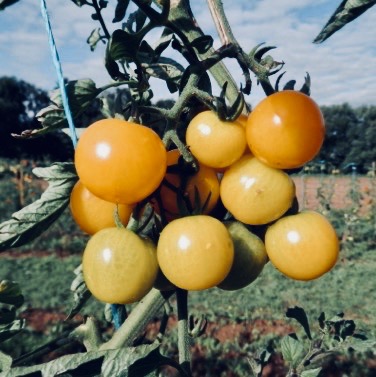Short Summary
Open Source Seeds fights market concentration and patents/privatization in the seed sector. They aim to ensure that seeds hold the legal status of a common good "by providing new varieties with an open-source license." Open Source Seeds provides a legal tool in the form of an open-source seed license.Website address: opensourceseeds.org
Location: Germany (based in Marburg)

Logo.
source ![]()
Profile
Especially in recent decades, fewer and fewer multinational companies have gained increasing control over the worldwide seed market, in a process of market concentration that continues to worsen.Open Source Seeds has several key goals:
- To increase genetic diversity among agricultural crop seeds in order to bolster food security and reduce manufactured dependence on powerful international corporations
- To return crop seeds to the status of a "common good," as they were for most of human history, up until the last century when seed privatization began
- To make sure that seeds can be accessed freely
Commonly owned seed presents more than just an input in agricultural production. Their usage benefits the whole society and is essential for maintaining biodiversity, cultural landscapes, ecosystem system services as well as the capacity to adapt to climate change. (source)
OSS advises farmers, breeders, seed propagators and the general public (via the media) about the purpose and function of its open-source license.
YOUTUBE MlKQLX_rieg This is a roughly two-minute overview of Open Source Seeds.
Governance
In order to assure commoners' consent in decision-making, Open Source Seeds underwent several years of consultation and research among farmers, breeders, commons experts and other stakeholders.Projects
Some examples of the seeds and other products that they have licensed as open-source, as part of their goal to "create a diverse and commons-based seed sector":
- Three varieties of tomatoes
- Three varieties of cereal grains
- One variety of sweetcorn
- One variety of chili
- Open-source wheat flour and bread, launched in Oct. 2019; for every kilo sold two cents go to supporting open-source plant breeding

The "Sunviva" tomato, the first seed variety that Open Source Seeds successfully protected from patenting.
source ![]()
Friends & Partners
- Association for AgriCultural and Ecology (AGRECOL), which founded Open Source Seeds
- Global Open-Source Seed Initiative (GOSSI), of which Open Source Seeds is a member organization
Finances
Open Source Seeds rejects the argument that it is untenable to finance plant breeding without relying on royalties from patents. Notably, the long history of plant breeding speaks against this assumption. And today, in many countries (especially those in the Global South), plant breeding does not depend on privatization for funding.OSS calls for a combination of funding mechanisms (private, commons and public), because commonly stewarded seeds benefit the entirety of society:
"Not only farmers and direct users should be engaged in covering the costs. Processors, traders and consumers - the whole value chain - and beyond that the government, should contribute." (source)
Additionally:
"Many organic cereal and vegetable breeders in Europe finance their breeding activities partly through 'variety development contributions' that are negotiated between breeders, seed producers and farmers. Some charge a small levy on traded items or raise funds from government programmes and donors. The funds generated in this way for plant breeding are still small but they are growing from one year to the next." (source)Learn more: "Who pays for seeds?" (Johannes Kotschi and Johannes Wirz, May 2015)
Origin Story
The process of creating Open Source Seeds began in 2011 with a few workshops of AGRECOL, where the question was raised as to whether rampant privatization in the seed sector could be challenged via a license, similarly to proprietary software.In 2012, more concrete preliminary ideas about "Biolinux" were discussed in German-speaking countries. A research project followed to study the legal environment and the feasability. Simultaneously, necessary community building took place, in particular through identification of farmers and breeders who would apply the license to their new varieties.
OSS went public in 2016.
See Also
- Open Source Seed Initiative (OSSI), a US-based equivalent that is also a member of GOSSI and that was founded in 2012 by Prof. Jack Kloppenburg